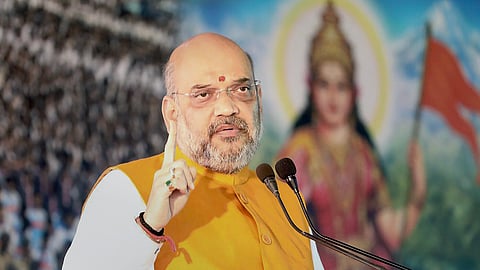

Follow TNM's WhatsApp channel for news updates and story links.
Union Minister Amit Shah has turned heads by reportedly sending an official letter in Malayalam, a move that has surprised many as it comes from one of the most vocal supporters of Hindi in the current government.
The letter has made news not so much for its contents, but for the language in which it was written. Addressed to John Brittas, the CPI(M) Rajya Sabha MP from Kerala, Shah’s letter merely acknowledges the receipt of an English letter that Brittas had sent to Shah.
This is not the first time that official letters have made news for being written in Malayalam. Earlier, Brittas himself had shot off a letter in Malayalam to Union Minister of State Ravneet Singh Bittu. This was after the Minister allegedly sent official communication repeatedly in Hindi. Accusing the Minister of always writing “exclusively in Hindi” and calling it a “deliberate policy”, Brittas had said that he was “compelled” to reply in Malayalam.
Decades earlier, in 1990, former Kerala chief minister EK Nayanar too had resorted to writing in Malayalam, after he received a Hindi letter from then Uttar Pradesh Chief Minister Mulayam Singh Yadav.
Over the years, Amit Shah has been at the centre of the Hindi imposition debate, and has been a vocal promoter of the language. In June this year, Shah had even said that “those who speak English will soon feel ashamed.”
Opposition leaders from south Indian states have repeatedly questioned the Union government over its imposition of Hindi language, especially through the implementation of the National Education Policy 2020.
In September this year, on the occasion of Hindi Diwas, Amit Shah said that Hindi is not a competitor of other Indian languages, but their friend. The Union Minister had even called for the language to grow beyond the medium of communication into the “language of science, technology, justice, and police administration”.
Shah’s promotion of the Hindi language has been poorly received in the south Indian states, especially from Tamil Nadu. In August 2023, Amit Shah had called for the acceptance of the Hindi language “without any opposition,” while speaking at a meeting of the parliamentary committee on Official Language. Chief Minister MK Stalin responded by calling it an “audacious push for acceptance” of Hindi.
On October 22, the CPI(M) Rajya Sabha MP had written to Amit Shah regarding an August 12 notification issued by the Union Ministry of Home Affairs with regards to the registration of Overseas Citizens of India (OCI).
The notification said that an OCI cardholder will lose their registration if they have been charge-sheeted for an offence entailing imprisonment of seven years or more. The notification does not require the case to be adjudicated by a court for the OCI registration to be withdrawn. In his letter to the Union Home Minister, Brittas requested that the notification be reviewed and annulled.
According to Brittas, “The inclusion of mere charge-sheeting as a ground for cancellation of OCI registration, without a judicial finding of guilt, raises profound legal and constitutional concerns. A charge sheet, being only a police document, carries no evidentiary or judicial finality.” He further stated, “The absence of a judicial finding prior to cancellation could expose OCI cardholders to arbitrary or prejudicial action, thereby undermining the constitutional guarantees of fairness and equality before law.”
In addition to being a violation of the presumption of innocence until proven guilty, the notification also doesn’t hold water in a statutory perspective, Brittas had argued. “Section 7D of the Citizenship Act, 1955 (as amended by Act 47 of 2019) authorizes cancellation of OCI registration only when the cardholder has violated a provision of the Act itself, or of any other law as may be specified by the Central Government by notification,” he wrote, adding, “[A]ny enlargement of the scope of clause (da) of Section 7D through an executive notification would, in effect, amount to an amendment of the parent statute without the sanction of Parliament.”